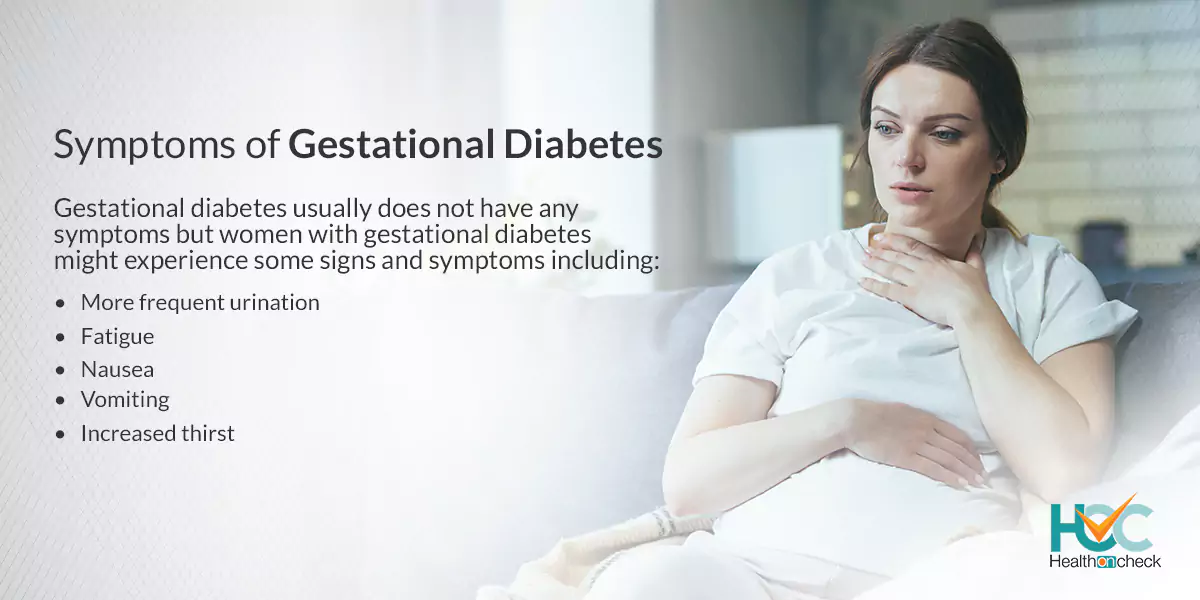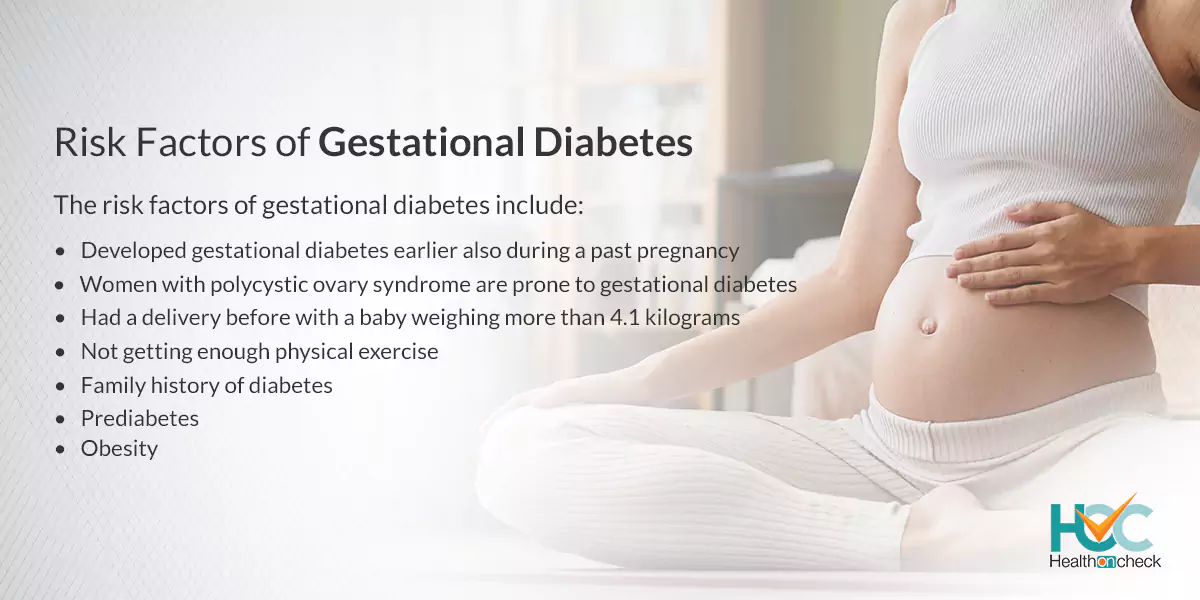What is Gestational Diabetes?

Gestational diabetes is a type of diabetes that develops during pregnancy where the blood sugar level becomes quite high, affecting the pregnant woman and her baby’s health adversely. Gestational diabetes normally occurs during the middle of the pregnancy, after 24 weeks. It’s not necessary that anyone with gestational diabetes had diabetes before as this type of diabetes mostly develops during pregnancy. If you have gestational diabetes then there can be some complications during delivery but the good news is that gestational diabetes can be controlled by eating healthy food, exercising, and medication if required.
What are the Symptoms of Gestational Diabetes?
Gestational diabetes usually does not have any symptoms but women with gestational diabetes might experience some signs and symptoms including:
– Fatigue
– More frequent urination
– Nausea
– Vomiting
– Increased thirst
What are the Causes of Gestational Diabetes?
The researchers are not able to know the exact cause of gestational diabetes and why some women get it and some do not. Excess weight before pregnancy might be a cause. Also during pregnancy, hormone levels of pregnant women change and since various hormones work to keep blood sugar levels in check, it makes it hard for the body to process blood sugar effectively which leads to an increase in blood sugar levels.
Sometimes, the action of the mother’s insulin to her body is blocked by hormones which results in insulin resistance. This insulin resistance makes it difficult for a pregnant woman to use insulin and because of this, she may need up to three times as much insulin to compensate which might result in gestational diabetes.
A pregnant woman can develop gestational diabetes when her body is not able to make and use all the insulin required for pregnancy. Without a proper amount of insulin, glucose can’t leave the blood and be transformed into energy and the blood sugar levels go up, resulting in gestational diabetes.
What are the Risk Factors of Gestational Diabetes?
The risk factors of gestational diabetes include:
– Obesity
– Not getting enough physical exercise
– Prediabetes
– Developed gestational diabetes earlier also during a past pregnancy
– Women with polycystic ovary syndrome are prone to gestational diabetes
– Family history of diabetes
– Had a delivery before with a baby weighing more than 4.1 kilograms
– People from certain ethnicity like Black, American Indian, Asian American, and Hispanic, are more likely to develop gestational diabetes
What are the Complications of Gestational Diabetes?
Gestational diabetes if not properly treated and managed can result in high blood sugar levels. High blood sugar can lead to various problems for the mother and the baby including the need for surgery to deliver (C-section).
Complications for the baby include:
-Excessive birth weight
If the blood sugar level of the mother is higher than the standard range, then the baby may grow too large. And those who weigh 9 pounds or more may become wedged in the birth canal, have birth injuries or delivery may have to be done through C-section birth.
– Early (preterm) birth
The risk of early labor and delivery before the due date might increase because of high blood sugar levels.
-Serious breathing difficulties
Babies who are born early might develop respiratory distress syndrome, a condition where breathing becomes difficult.
– Low blood sugar (hypoglycemia)
Babies might have low blood sugar (hypoglycemia) shortly after birth which may also cause seizures.
– Obesity and type 2 diabetes
Babies become prone to developing type 2 diabetes and obesity and type 2 later in life.
– Stillbirth
In some cases, untreated gestational diabetes can cause the death of a baby before or shortly after birth.
Complications for the mother include:
– High blood pressure and preeclampsia
Gestational diabetes increases the risk of high blood pressure in the mother. It can also cause preeclampsia which causes high blood pressure and other complications fatal to both mother and baby.
– Having a surgical delivery (C-section)
Mothers with gestational diabetes mostly have a C-section delivery.
– Future diabetes
The risk of gestational diabetes again during future pregnancy increases. Also as the mother grows older, the chances of developing type 2 increase.
How Gestational Diabetes is Diagnosed?
A screening test during your second trimester — between 24 and 28 weeks of pregnancy will be done if you have an average risk of developing gestational diabetes. In case you had gestational diabetes during a previous pregnancy, are obese, or have a family history of diabetes then a screening test will be done at your first prenatal test.
The screening tests to diagnose gestational diabetes include:
– Initial glucose challenge test
Here your blood sugar levels will be checked after an hour of giving you a syrupy glucose solution to drink. If you have a blood sugar level of 190 milligrams per deciliter (mg/dL), or 10.6 millimoles per liter (mmol/L), then you have gestational diabetes.
A blood sugar level below 140 mg/dL (7.8 mmol/L) is generally considered to be under the standard range on a glucose challenge test.
– Follow-up glucose tolerance testing
It is the same as the initial test but the sweet solution will contain more sugar and your blood test will be done every 3-4 hours if at least two of the blood sugar readings are higher than expected, then it indicates gestational diabetes.
What are the Treatment Options Available for Gestational Diabetes?
Treatment options for gestational diabetes include:
Lifestyle changes
A healthy lifestyle is important to keep diabetes at bay and it includes a healthy diet and proper physical exercise. Also, doctors don’t advise losing weight during pregnancy because your body is trying hard to support your growing baby.
Lifestyle changes usually include:
– Healthy diet
It’s very important to have a healthy diet consisting of fruits, vegetables, lean protein, and whole grains- high in nutrition and fiber and low in fat and calories — and you should reduce food with highly refined carbohydrates, such as sweets. Your current weight, pregnancy weight gain goals, blood sugar level, exercise habits, food preferences, and budget can be managed with the help of a trained dietician.
– Staying active
It’s very important to have regular physical activities to have a healthy body before, during, and after pregnancy. Exercise reduces your blood sugar levels. Physical activities such as walking, cycling, and swimming are good choices during pregnancy.
Blood sugar monitoring
While you’re pregnant, your blood sugar will be checked four or more times a day to make sure your level stays within a healthy range.
Medication
If diet and exercise are not able to control your blood sugar levels, then insulin injections are given to lower your blood sugar.
Sometimes oral medications are also given to manage blood sugar levels but more research is required to make sure that oral medications are as safe and as effective as injectable insulin to manage and control gestational diabetes.
Living with Gestational Diabetes
Gestational diabetes is a treatable and manageable condition and you can have a healthy pregnancy and a healthy baby if you have gestational diabetes. Usually, the blood sugar levels come down after delivery and your hormone levels return to normal. But around half of those with gestational diabetes develop Type 2 diabetes later in life. You should have a healthy diet and exercise to lower your risk of developing type 2 diabetes. Your doctor may advise you to go for blood glucose tests every six to 12 weeks after pregnancy to check for diabetes.
Whom to Consult?
You have to go to health care early when you first think about trying to get pregnant because then your doctor can check your risk of gestational diabetes along with your overall wellness. After you become pregnant, you will be checked for gestational diabetes regularly as a part of your prenatal care. If you have gestational diabetes, you may have to go for checkups more often. You will monitor your blood sugar level and your baby’s health before and after delivery and will take all the measures to make sure you have a safe and healthy delivery.






